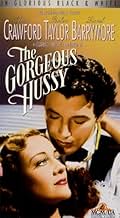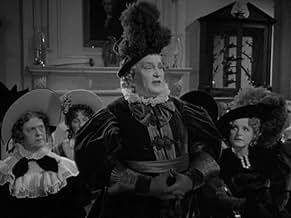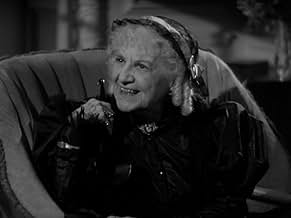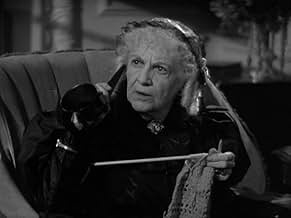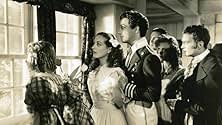IMDb RATING
5.6/10
1.4K
YOUR RATING
President Andrew Jackson's friendship with an innkeeper's daughter spells trouble for them both.President Andrew Jackson's friendship with an innkeeper's daughter spells trouble for them both.President Andrew Jackson's friendship with an innkeeper's daughter spells trouble for them both.
- Director
- Writers
- Stars
- Nominated for 2 Oscars
- 4 wins & 2 nominations total
Rubye De Remer
- Mrs. Bellamy
- (as Ruby de Remer)
- Director
- Writers
- All cast & crew
- Production, box office & more at IMDbPro
Featured reviews
THE GORGEOUS HUSSY, based on a 1934 historical novel by Samuel Hopkins Adams, is another one of those genteel forays into the past from squeaky clean MGM. The only compelling ingredients in this overlong saga about the controversial hussy Peggy Eaton who wielded much influence over President Andrew Jackson are a few of the performances and the novelty of actual political debates occurring in the context of a love affair; Hollywood seldom mixed those two elements. The first half hour is bone dead, with familiar performers strutting around in period costumes and delivering the necessary exposition. Joan Crawford is not particularly persuasive as a young tavern keeper's daughter. She looks somewhat haggard and hard, but still beautiful. Things liven up with the appearance of Andrew Jackson (Lionel Barrymore) and his unpopular and maligned wife Rachel (Beulah Bondi). Barrymore may have been a ham who gave basically the same performance in film after film, but at least he puts some juice into the proceedings, making the most he can of the extremely diluted representation of Jackson supplied by the script. Bondi is touching in her depiction of the ill-fated Rachel, the love of Jackson's life. Until then we have had to endure endless moments with a dashing but wooden Melvyn Douglas and a competent but unexciting contribution from neophyte Robert Taylor. Jimmy Stewart and later Franchot Tone are on hand too but only in a few scenes and to little effect. And we have the always nasty and conniving Alison Skipworth as a disapproving society matron to hold our attention. And the marvelous Zeffie Tilbury as Skipworth's deaf mother who disagrees strongly with her snobbish daughter's malicious gossip. Between these bits there are occasionally interesting sketches of the political contentions of the time, mostly about how much power should be granted to the individual states, foreshadowing the Civil War. But we never get a sense of what an extraordinary woman the title character was. Nothing in Joan Crawford's performance or in the material given her indicates that this is anything other than an unusually attractive and well behaved lady with romantic yearnings but someone for whose honor and reputation a President would dissolve his cabinet and change the course of US history? No way. You cannot make a polite film about these characters in this historical period, but this is what MGM tried to do.
If you think Joan Crawford is gorgeous, you're in much better shape than I was to watch The Gorgeous Hussy, since she plays the title character. Despite what the title leads you to believe, this is a movie about President Andrew Jackson. Lionel Barrymore plays the beloved president, and he puts his whole heart into the many speeches the script provides. Beulah Bondi plays Rachel Jackson, and in case you don't know your history, I won't tell you anymore, except that she was nominated for Best Supporting Actress in 1937.
Where does Joan Crawford come in, and why is the movie named after her? She's Jackson's niece, and she's desperately in love with a much older senator, Melvyn Douglas. When he sends her away for her own good, she throws herself into a relationship with the second man who flirts with her, Robert Taylor. A very young, gawky James Stewart is the first man, but she doesn't want anything to do with him. Robert is handsome and flirtatious, but he's also a sailor and therefore a little untrustworthy.
Joining the cast is Joan's then-husband Franchot Tone, Louis Calhern, and Gene Lockhart. The film alternates between a political drama and a love triangle between Joan, Melvyn, and whichever guy Joan is flirting with at the moment, hence the title. If you know your trivia about Gone With the Wind, you'll know that Melvyn Douglas was on the short-list for Ashley Wilkes, and after you watch this movie, it's easy to imagine him running circles around Leslie Howard's performance. He would have been a wonderful Ashley Wilkes, and if you agree, rent this movie for the next best thing.
Where does Joan Crawford come in, and why is the movie named after her? She's Jackson's niece, and she's desperately in love with a much older senator, Melvyn Douglas. When he sends her away for her own good, she throws herself into a relationship with the second man who flirts with her, Robert Taylor. A very young, gawky James Stewart is the first man, but she doesn't want anything to do with him. Robert is handsome and flirtatious, but he's also a sailor and therefore a little untrustworthy.
Joining the cast is Joan's then-husband Franchot Tone, Louis Calhern, and Gene Lockhart. The film alternates between a political drama and a love triangle between Joan, Melvyn, and whichever guy Joan is flirting with at the moment, hence the title. If you know your trivia about Gone With the Wind, you'll know that Melvyn Douglas was on the short-list for Ashley Wilkes, and after you watch this movie, it's easy to imagine him running circles around Leslie Howard's performance. He would have been a wonderful Ashley Wilkes, and if you agree, rent this movie for the next best thing.
Joan isn't all that gorgeous, only a halfhearted hussy, and not much of an actress, either--at least not here. Rather, she's a nice but confused innkeeper's daughter in 1820s Washington with love and politics on the brain. Mostly she lifts her considerable eyebrows up and down, up and down, to indicate joy, worry, bafflement, empathy, ecstasy... All the while she's pursued by most of the leading men of MGM circa 1936, for reasons best known to them, since there's nothing particularly fascinating about her character. This lengthy melodrama does have first-rate production values and intermittent good acting, especially from the quieter performers, Melvyn Douglas and (most of all) Beulah Bondi, as a gentle, pipe-smoking Mrs. Andrew Jackson. But as a historical romance it's rather listless, with a rote Snidely-Whiplash villain (Louis Calhern) and much nattering about states' rights. The conflicts feel painted-on. The ending feels hurried and contrived. And Joan always seems to be looking for her key light.
Fanciful, but silly biography of Peggy Eaton (Crawford), a controversial figure during the Andrew Jackson administration in the late 1820s, and her relationships with influential men of that era. Semi-fiction story is "gorgeous" to look at thanks to elegant period settings and costumes, not so much the performances or script.
'The Gorgeous Hussy' had a lot of potential to be good. The subject sounded really interesting. Clarence Brown may not be one of my favourite directors, but he did do some good films. His films more often than not looked great and he was often very good in his direction of his lead actresses, a prime example being Greta Garbo. Have always loved period drama films. Plus who can resist a cast with the likes of Joan Crawford, Lionel Barrymore, Melvyn Douglas and Beulah Bondi in the same film?
Sadly, the film was a pretty major disappointment. There are certainly far worse films out there and it has its good things, but a story that actually is a lot more interesting than the film made it deserved better. As far as Brown's films go it is a lesser effort and it is a lesser effort of Crawford's too, both film and performance. Everybody, even the few actors that came over well, did a lot better both before and since (primarily since as some of the cast are in early roles).
Certainly there are good things. The best asset is the production values. It is sumptuously designed and costumed and even better is the cinematography, it clearly loved Crawford who didn't always look this luminous at this point of her career. The best performance belongs to Barrymore, he has the juiciest character and gives the role so much zing and enthusiasm (it may not be what one calls a subtle performance but then again Barrymore was not a subtle actor, which is not actually a bad thing in his regard).
Bondi also comes over very well, making the very most with what she was given. The score is not too over-bearing or melodramatic.
Most of the cast disappoint. Crawford to me was too mannered in her role and never seemed to gel with the setting with too modern a look. Douglas, Robert Taylor, Franchot Tone and James Stewart all gave their fair share of good performances, but all four are dull in sketchy roles. Tone is particularly wronged and doesn't look comfortable with dispiriting material. Brown's direction at best is undistinguished and quite leaden.
Also felt that the story never properly engaged, with too deadingly dull a pace and with too much narratively being too uneventful. It is a shame too that the story didn't have the same amount of juice and venom that the character of Andrew had and took on a far too careful approach that made the film feel very safe. The script is well intentioned, but came over as too talky and preachy.
Summarising, rather lacklustre though not without good things. 4/10
Sadly, the film was a pretty major disappointment. There are certainly far worse films out there and it has its good things, but a story that actually is a lot more interesting than the film made it deserved better. As far as Brown's films go it is a lesser effort and it is a lesser effort of Crawford's too, both film and performance. Everybody, even the few actors that came over well, did a lot better both before and since (primarily since as some of the cast are in early roles).
Certainly there are good things. The best asset is the production values. It is sumptuously designed and costumed and even better is the cinematography, it clearly loved Crawford who didn't always look this luminous at this point of her career. The best performance belongs to Barrymore, he has the juiciest character and gives the role so much zing and enthusiasm (it may not be what one calls a subtle performance but then again Barrymore was not a subtle actor, which is not actually a bad thing in his regard).
Bondi also comes over very well, making the very most with what she was given. The score is not too over-bearing or melodramatic.
Most of the cast disappoint. Crawford to me was too mannered in her role and never seemed to gel with the setting with too modern a look. Douglas, Robert Taylor, Franchot Tone and James Stewart all gave their fair share of good performances, but all four are dull in sketchy roles. Tone is particularly wronged and doesn't look comfortable with dispiriting material. Brown's direction at best is undistinguished and quite leaden.
Also felt that the story never properly engaged, with too deadingly dull a pace and with too much narratively being too uneventful. It is a shame too that the story didn't have the same amount of juice and venom that the character of Andrew had and took on a far too careful approach that made the film feel very safe. The script is well intentioned, but came over as too talky and preachy.
Summarising, rather lacklustre though not without good things. 4/10
Did you know
- TriviaAccording to Melvyn Douglas, Joan Crawford got herself to cry by listening to recordings of "None but the Lonely Heart".
- GoofsThey are singing "Wait for the Wagon" on the hayride, but it wasn't written until 1850. "America" and "Listen to the Mockingbird" were not written at this time either.
- Quotes
Daniel Webster: Well Miss Peggy, have you shaped any new political doctrines today?
Peggy Eaton: Ah Mr. Webster, I'm just an impressionable young woman.
- Crazy creditsPrologue: "This story of Peggy Eaton and her times is not presented as a precise account of either--rather, as fiction founded upon historical fact. Except for historically prominent personages, the characters are fictional. The city of Washington in 1823--heart of a country not yet a century old, not yet beyond an occasional growing pain."
- ConnectionsFeatured in Great Performances: James Stewart: A Wonderful Life (1987)
- SoundtracksAmerica, My Country Tis of Thee
(uncredited)
Music by Lowell Mason
Music based on "God Save the King" written by Henry Carey
[Played in the opening scene as part of the score]
- How long is The Gorgeous Hussy?Powered by Alexa
Details
- Release date
- Country of origin
- Language
- Also known as
- La divina coqueta
- Filming locations
- Production company
- See more company credits at IMDbPro
Box office
- Budget
- $1,119,000 (estimated)
- Runtime1 hour 43 minutes
- Color
- Aspect ratio
- 1.37 : 1
Contribute to this page
Suggest an edit or add missing content



